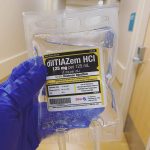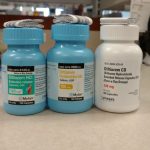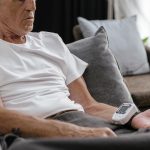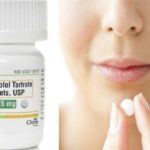What Not To Take With Diltiazem?

For most people, taking a new medication may mean switching up your lifestyle a bit and that includes the foods you eat. A food-drug interaction means that a specific nutrient or compound within the food changes the way your body metabolizes the medication, and this can either enhance or reduce the dose your body gets, according to Johns Hopkins Medicine. The potential results: an increased risk of side effects, many of which can be dangerous, or the drug not working as it was intended. Before introducing a medication, ask your pharmacist about any food interactions, including with alcohol, and any adjustments you may have to make to your diet
What is diltiazem?
Diltiazem is a calcium channel blocker that slows your heart rate and relaxes your blood vessels. This gets more oxygen to the heart so it doesn’t have to work as hard to pump, which relieves chest pain.
Diltiazem is used to treat chest pain and high blood pressure. Diltiazem belongs to a class of drugs called calcium channel blockers. A class of drugs refers to medications that work similarly. They have a similar chemical structure and are often used to treat similar conditions.
Diltiazem works by relaxing the blood vessels in your heart and body. This reduces your blood pressure. This drug also lowers your heart rate and dilates your coronary arteries. This means that your heart doesn’t have to work as hard to pump blood throughout your body. These effects, combined with lowering your blood pressure, help to reduce your chest pain.
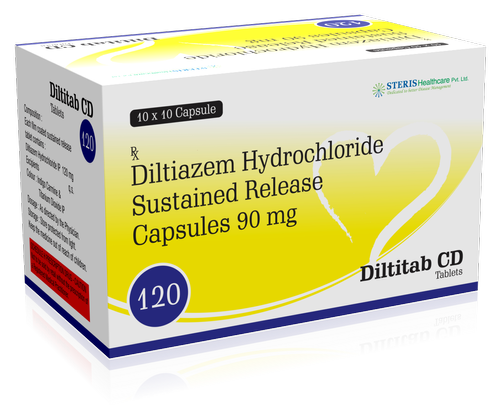
How should Diltiazem be used?
Diltiazem comes as a tablet, an extended-release (long-acting) tablet, and an extended-release capsule to take by mouth. The regular tablet is usually taken three or four times a day. The extended-release capsule and tablet are usually taken one or two times a day. Ask your pharmacist if you should take diltiazem with or without food, because instructions may vary with each product. Take diltiazem at around the same time(s) every day.
Diltiazem is taken four times a day. The total amount in a day typically ranges from 180–360 mg.
Follow the directions on your prescription label carefully, and ask your doctor or pharmacist to explain any part you do not understand. Take diltiazem exactly as directed. Do not take more or less of it or take it more often than prescribed by your doctor.
Swallow the extended-release capsules and tablets whole; do not chew or crush them.
Your doctor will probably start you on a low dose of diltiazem and gradually increase your dose, not more than once every 7 to 14 days if you are taking the extended-release tablet or capsule and not more than once every 1 to 2 days if you are taking the regular tablet.
If taken regularly, diltiazem may control chest pain, but it does not stop chest pain once it starts. Your doctor may give you a different medication to take when you have chest pain.
Diltiazem controls high blood pressure and chest pain (angina) but does not cure them. It may take up to 2 weeks before you feel the full benefit of diltiazem. Continue to take diltiazem even if you feel well. Do not stop taking diltiazem without talking to your doctor.
What not to take with diltiazem?
When taking diltiazem avoid drinks, foods, or diet pills that contain caffeine, such as coffee, tea, cola, and chocolate. Taking a stimulant together with this drug can increase your risk of unpleasant side effects and affect the way the drug works.
Avoid alcohol while taking diltiazem, because it lowers your blood pressure and adds to the effects of diltiazem. You may experience dizziness, lightheadedness, fainting, or a rapid heartbeat if you drink alcohol with diltiazem, especially when you first start taking the medication or just after a dose increase.
Grapefruit juice may also increase the effects of diltiazem in some people by increasing its levels in the blood. You may want to limit or avoid excessive consumption of grapefruit and grapefruit juice during treatment with diltiazem. However, if you have been regularly consuming grapefruit or grapefruit juice with diltiazem, do not alter the amounts of these products in your diet without first talking to your doctor or other healthcare professional. Contact your doctor if your condition changes or you experience increased side effects of diltiazem such as headache, irregular heartbeat, swelling, unexplained weight gain, or chest pain. Orange juice is not expected to interact.
Medications that can affect the removal of diltiazem from your body, which may affect how this medication works include cimetidine, St. John’s wort, azole antifungals such as ketoconazole, macrolide antibiotics such as erythromycin, rifamycins including rifabutin and rifampin.
What are the side effects of diltiazem?
Diltiazem may cause side effects. Tell your doctor if any of these symptoms are severe or do not go away:
• constipation
• cough
• diarrhea
• dizziness or lightheadedness
• flushing
• headache
• nasal congestion
• slow heartbeat
• vomiting
• weakness
Some side effects can be serious. If you experience any of the following symptoms, call your doctor immediately or get emergency medical treatment:
• difficulty breathing or swallowing
• extreme tiredness
• fainting
• flu-like symptoms
• increase in frequency or severity of chest pain (angina)
• lack of energy
• loss of appetite
• nausea
• pain in the upper right part of the stomach
• rash
• swelling of the face, eyes, lips, tongue, hands, arms, feet, ankles, or lower legs
• unusual bleeding or bruising
• yellowing of the skin or eyes
If you experience a serious side effect, you or your doctor may send a report to the Food and Drug Administration’s (FDA) MedWatch Adverse Event Reporting program online (http://www.fda.gov/Safety/MedWatch) or by phone (1-800-332-1088).

